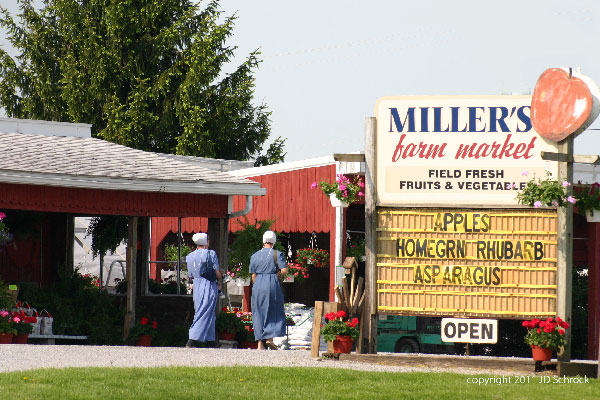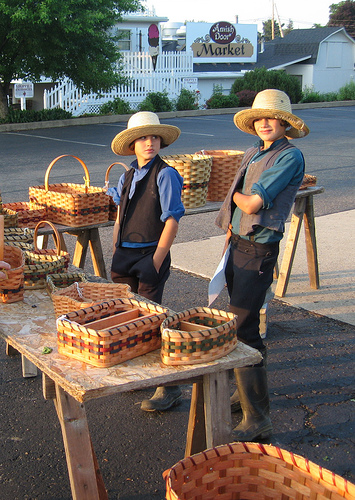The Economic Structure of the Amish
When it comes to financial and economics the Amish are typically pretty good with money. One thing that is not allowed is ownership of any form of insurance policy. If a family was to face some form of hardship they would look to the church and their community for assistance. For instance, if a house or barn burns down the community will respond in a swift manner helping them rebuild. Many times if the family is unable to absorb the financial stress the deacon goes to other families in the district searching for help. The Amish family that receives the assistance knows that they will have the opportunity to repay the help when tragedy strikes another family. That's not the only way that church will assist families in need though. If Amish family find themselves in situation where they are stretched thin with finances they may turn to the church for help. They do this knowing that they will eventually have to pay it back. This usually does not pose a problem because the Amish are known to work extra hard in order to pay their debts off early. As a matter of fact when looking at the housing market in the Amish culture a thirty year mortgage is unheard of.
There are many Amish business owners throughout their communities. Many retail consumers from the English community travel into the Amish settlements to patronize their stores, shops, and restaurants. Many Amish businessmen are very successful due to their solid work ethics and business acumen. Farming used to be one of the main sources of income in the Amish community but because of the rising cost of land they have now been forced to utilize their craftsmanship skills. It used to be discouraged by the church to run shops or businesses that weren't connected to the businessman's farm. However, the church realized that they needed to change that stance out of necessity. When the prices of acreage increased by almost 400% over the past two decades it was not hard to see why the church has loosened its stance.
There is no doubt that the solid foundation of ethics and morals that parents instill in their children from young ages are key components to their continued success. These morals and ethics can be seen by the way the children contribute with their paychecks until they turn 21 years old. It is a key factor in the survival of some of the larger families. The children do this also with an understanding that when they marry one day their parents will do something to contribute to their finances. This may come in the form of assisting in the purchase of a home, farm, or business.


Citations
- Amish America. (n.d.). Retrieved 2010, http://www.amishamerica.com/amish-online-encyclopedia/
- Amish Buggy near Berlin, Ohio [Photograph]. (2005, May 1). Retrieved fromhttp://www.rlrouse.com/berlin-oh-amish.html
- Amish family riding in a buggy [Photoq]. (2004, May 20). Retrieved from http://en.wikipedia.org/wiki/File:Lancaster_County_Amish_03.jpg
- Amish Family Walking [Photo]. (2009, June 27). Retrieved fromhttp://truehealthistruewealth.blogspot.com/2009/06/amish-fat-loss-secret.html
- Amish House [Photograph]. (n.d.). Retrieved from http://www.welcome-to-lancaster-county.com/amish-house.html
- Amish house with porch [Photograph]. (n.d.). Retrieved from http://www.welcome-to-lancaster-county.com/amish-house.html
- Amish Information. (2011). Retrieved November 14, 2011, from http://www.oacountry.com/amishknowlegebase1
- Amish School house [Photo]. (2010, December 16). Retrieved from http://www.visitlawrencecounty.com/amish_countryside.asp
- Cariaga, D. (2007, August 8). Amish Church [Digital Photo]. Retrieved from http://dadecariaga.blogspot.com/2007_08_01_archive.html
- Coleman, B. (2008, April 21). Amish Plow [Photograph]. Retrieved from http://amishamerica.com/they-dont-make/
- Kasey (2010, May 5). Amish Business [Digital Photo]. Retrieved from http://blog.thefolderstore.com/2010/05/05/hard-work-values-business-success/
- Kaster, C. (2006, October 3). Amish School [Digital Photo]. Retrieved from http://www.cbc.ca/news/world/story/2006/10/03/amish-shooting.html
- Powell, A. (2011). Amish 101 - Amish Beliefs, Culture & Lifestyle. Retrieved November 14, 2011, from http://pittsburgh.about.com/cs/pennsylvania/a/amish.htm
- Robin (2007, July 20). Amish women on a bicycle [Digital Photo]. Retrieved from http://robinsnestingplace.blogspot.com/2007/07/shipshewana-in.html
- Schrock, J. (2011, May 12). Miller's farm Market [Digital Photo]. Retrieved from http://www.amishleben.com/2011/05/millers-farm-market-now-open/
- Thomas, C. (2011, April 15). Barn Raising [Photograph]. Retrieved from http://christhomasdesign.wordpress.com/2011/04/15/thoughts-on-amish-barn-raising/
- Typical Amish Clothing [Photo]. (2010, May 20). Retrieved from http://www.traveljournals.net/pictures/258816.html
This page was created by Ken Highman on November 22, 2011.
This page was modified on December 12, 2011.
For comments or questions you can submit an email to:ken.highman@rasmussen.edu